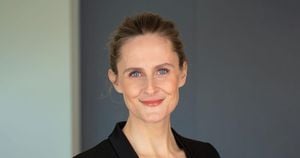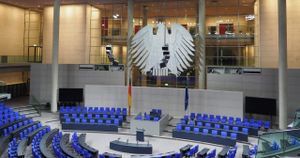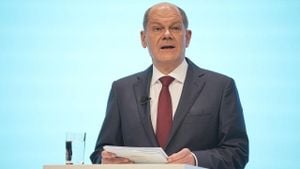Pope Francis remains hospitalized and critically ill, sparking widespread concern about his health and the future of leadership within the Catholic Church. The 88-year-old pontiff has been battling pneumonia and complex lung infections since he was admitted to Rome's Gemelli Hospital on February 14, 2025. Reports highlight his condition as grave, as he received oxygen support and blood transfusions to combat low platelet counts, which are necessary for clotting.
Despite these challenges, Vatican spokesman Matteo Bruni reported on Sunday morning his “tranquil” night following the respiratory crisis, indicating the Pope remains alert but facing serious health complications. Doctors have advised the situation is precarious, especially for someone with the pope's underlying health issues.
Critically, the absence of formal provisions within the Catholic Church’s Canon Law for cases where the pope is incapacitated has emerged as a significant issue. While the Church has established protocols for when the papal office becomes vacant after death or resignation, there are no guidelines for when the pope can no longer fulfill his duties due to health concerns.
Canon 335 states, "when the Holy See is vacant or entirely impeded, nothing can be altered in the governance of the Church," but it does not clarify what is meant by "entirely impeded." This ambiguity has triggered discussions about legislative reforms. Canon lawyers are advocating for changes to address the potential for future scenarios where the pope is alive but unable to govern effectively.
One such initiative was launched in 2021, with Geraldina Boni, one of the coordinators, stating, “a widespread consensus formed” around the need for formal protocols. The proposed reforms suggest establishing criteria for declaring when the pope is "totally impeded," which would enable the College of Cardinals to assume control temporarily.
Among the officials responsible for Church governance during this time is Cardinal Pietro Parolin, the Secretary of State. He and other high-ranking officials continue to manage the day-to-day affairs of the Vatican. Nonetheless, their authority hinges on the pope’s health status, leading many to question the succession process should things worsen.
Several potential successors to Pope Francis are already being discussed, which include Cardinal Peter Erdö, who is noted for his conservative views, Cardinal Pietro Parolin, regarded as the frontrunner due to his influential position, and Cardinal Matteo Zuppi, known for his progressive takes on issues such as LGBTQ rights. Cardinal Raymond Leo Burke's name is also mentioned, representing traditionalist views, throwing more complexity onto what the future may hold for the Church's direction.
Speculation about the next leadership has intensified alongside concerns over Pope Francis's deteriorated health. Experts suggest the next papal conclave could witness significant ideological divides depending on who gets elected. The conclave involves rigorous voting protocols, requiring two-thirds majority ratified by the eligible electors under 80 years of age.
Interestingly, Pope Francis had previously indicated he prepared for his own potential resignation by writing a letter soon after his election. This letter was supposedly handed over to the then-Secretary of State, but its contents have never been disclosed, raising additional questions about the clarity of the succession process under current Canon Law.
Historically, similar situations have arisen; Pope Paul VI expressed similar sentiments about future incapacitation, advising the College of Cardinals to accept his resignation if he were unable to serve. Nonetheless, no prior pope has ever needed to invoke such provisions, leaving the Catholic Church potentially unprepared for this unprecedented crossroads.
Given the current trend of Pope Francis’s health, speculation and preparation for future leadership becomes ever more urgent. Experts and canon lawyers are adamant about addressing these legislative gaps. The urgency is palpable as faith leaders and followers around the globe await updates, hoping for the pope's recovery but also preparing for what lies beyond.
Overall, the health of Pope Francis not only raises possible outcomes concerning Church governance but also forces contemplation among Vatican leadership about how to address doctrinal alignments moving forward. Each potential successor possesses varying ideologies, reflecting diverse paths the Catholic Church might choose as it navigates contemporary challenges.



